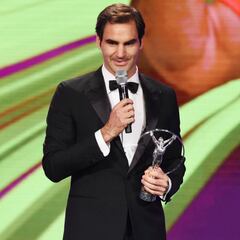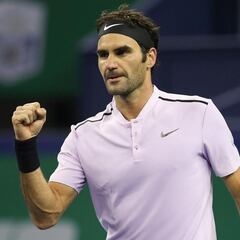Federer: "Nadal and I have shared great moments on and off court"
Roger Federer analysed his excellent friendship with Spaniard Rafa Nadal after the Swiss player was honoured with two Laureus awards.

A content Roger Federer spoke after winning two Laureus awards after a spectacular 2017 season for the Swiss player. He spoke to the media in Montecarlo after picking up the prestigious awards.
Federer: I've made some big, big decisions along the way with my team and I think my positivity, my love for the game and maybe my clarity as well in those difficult moments helped me to be here right now today.
Game, set and match! 🎾@rogerfederer is the Laureus GOAT!#Laureus18 pic.twitter.com/PKFYAH0hjj
— Laureus (@LaureusSport) February 27, 2018
Q: And these are for your doctors and fitness staff and everyone else who helped you.
RF: Every step of the way. The doctor was confident, positive that everything would turn out well, but there was always a risk. My physio was very clear what I was getting into to, and always keeping me very positive. My fitness coach has been with me for almost 20 years basically, he's been unbelievable, he's been with me every step of the way. He wanted extra time to get me back. And then my coaches had to be incredibly patient before they could get me back on the tennis court and then I did finally come back, they were ready and they prepared me for every match I've played after that.
Q: I think this makes six Laureus awards in total now, while we're on numbers, your career wins stands at 95, correct me if I'm wrong, that's career wins in all tournaments, not just Grand Slams.
RF: I've won 97 titles.
Q: 97! Ok.
RF: In tennis match wins I've got over 1,000. That's why I was confused! Where does 95 come from.
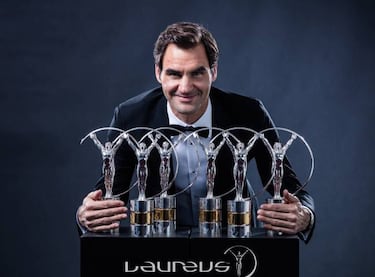
Q: My question is, can you get to 100. Is that possible?
RF: Good question. I don't even set it as a goal. It's just something that would be fun to reach, because I never thought I would be a player who could reach this high. I remember very vividly saying after I'd won my first tournament back in 2001 in Milan, at least I have one. For the rest of my life I can always tell maybe my children or my parents that I won one title. So you can imagine sitting here with six Laureus and 97 titles, you know, dreaming about 100 maybe is pretty surreal. But I'll try, but I have to stay healthy, hungry, motivated and everything which I don't worry so much but the healthy bit is clearly more of a challenge so we'll see how it goes.
[Questions from the audience]
Q: Rafael Nadal. We all know you two are the biggest rivals on the tennis court. What's the key to the rivalry and the fact you are friends off the court.
RF: Well the rivalry on court is very clear. We play very differently, and with different intensities, but we're both champions and we both try the same way to win a match. It's hard work, tough mentally, blessed with a lot of talent, and with him being a lefty, me being a righty, him being double-handed, me being one-handed, it's just a great rivalry and a great clash for both of us. Friends off the court, is just because we've had some good moments away from it, maybe for charity matches for his foundation, for my foundation, him inviting me to come to the opening of his academy, playing doubles together at the Laver Cup, and just all the match you've played against one another, just connect you to some extent.
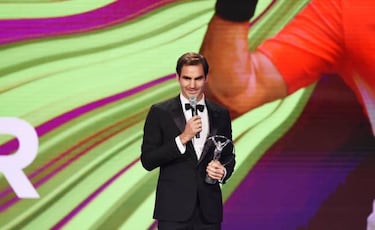
You lose against a guy 9-7 in the fifth or you win against a guy 9-7 in the fifth it leaves something special there forever. When you walk past them you know there was a match that shaped your character. We always enjoy each other's company, he likes seeing my children, my wife, I like the same on his side. But we know there is always a big rivalry at stake always, and the fans know that and it's all good.
Q: Can you give us an insight into times when adversity and coming back from injury and how you dealt with that. It's not always success, it's the tough moments.
RF: I'm a very positive thinker, so I always try to see the glass half-full, even though things are difficult sometimes. And also I was getting impatient sometimes with my progess, with my knee especially, after Wimbledon, I didn't have surgery then, I had surgery after the Australian Open, where I did come back after two months, but I just don't know my knee never really recovered. After Wimbledon I felt like I should really be ok after two months, maybe three... and when my team told me I needed I needed at least four months of fitness with rehab, and tennis only after that, I was pretty shocked and it's hard to stay positive in that very moment, but then you go to work and you see improvements almost on a daily basis and it becomes easier, but when things start stagnating and things become complicated, this is where you need to have good talks, with your wife, with your coaching team, with friends, and what I saw was the positive, that I could be home in one place for longer than three weeks.
I've come to realise that for 18 to 20 years, my life had never been in one place longer than four weeks, so here I am six weeks in Switzerland, six weeks where I train, and everything became so relaxed. I could make plans with my friends, lets meet on Monday, let's meet for lunch on Tuesday, let's go for a hike on Wednesday. It was a great thing, and I think that actually, it really relaxed me. So I think that on my comeback I was basically to some extent a different person, because I'd had those six months away, which really freed my mind in a big way.
Q: You're one of the best athletes of all time. You're elegant, you're polite, you receive an award and you stand on stage and dedicate it to your big rival, I have to go back home tomorrow and try to convince my wife that you're not perfect. I don't know if you could please confess a flaw that I can tell her about. Please. [Laughter]
RF: Just tell her there are a lot of things where I'm not perfect. When you are a husband and a dad you don't do a lot of things perfect. It's a battle on a daily basis, in a good way, to always stay calm. It's just almost impossible, but I try to be the best dad I can be, I try to be the best husband I can be, the best tennis player I can be and I make a million mistakes, but I try to learn from the mistakes, but I'm definitely not perfect. Easy answer.
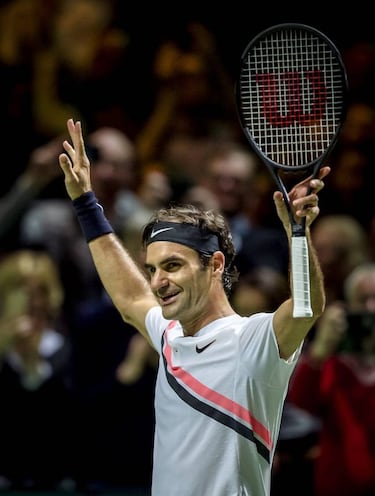
Q: Talking of perfection. When you are in full flow, and things are working and you're hitting the lines and everything, it looks great from the outside, can you describe how it feels from the inside, those moments when all the years of training come flooding back out and you are completely in the zone and things just happen.
RF: It's always a bit of a surprise to me when that happens, because I know I've worked hard and I know hitting the lines can happen, but you are so far away from the other side of the court, sometimes, so to put the ball on a certain location at a very given moment, sometimes you just wonder like, wow! that was surprising. I can't believe it myself. But there you go, the hard work, and being in the zone it happens very, very rarely, but when it happens it feels like everything is in slow motion for you and fast forward for your opponent and you start feeling like you will not lose this match and when you start feeling like this, 99% of the time you just won't lose, because you're too clear in your decision making, you're not on panic, you're moving well, without even thinking and everything in tactics is all aligned. It's a very strange feeling, but it's definitely one of the best you can have as an athlete.
Q: With your comebacks, we've been so accustomed to seeing you winning, titles and Grand Slam titles, when you are coming back, there's no guarantee that you are going to win another big prize, how has that been to overcome that and then go and play and perform the way you have been.
RF: What's been strange sometimes, or normal I guess in a way, is sitting in front of the press. This is not the usual place I sit in front of, it's usually tennis press people, and they keep asking you the same questions: When are you going to retire, do you think you can win again, do you think you can beat that player on that surface, whatever the questions may be. And this sort of questions I've had to answer since 2009, so I go a long way back.
And since I won the French Open, people have asked me about retirement, and it has not stopped because everybody has to keep asking me because they want to be the first to know in case I did take the decision two minutes ago. [Laughter]. So it's like a hammer, banging at the door, eventually you feel like it's going to break through, so you have to hold back the door and not let that come to you.
I think it's made me extremely resiliant and strong having to answer all these questions, because I know it's just questions but it's after every single match, before every single tournament I get asked these kind of questions. When you're playing better they evaporate, and they talk about forehands and the backhands and opponents and other things. And you're like why are you asking me this kind of question in a press conference, but anyway I understand, so I think it's been a big challenge for me, not letting that get to my head and truly listening to myself and my team and everybody around me, can I actually still win.
And as long as I said I can truly still believe I can win then I believe it's worth it to come back from injury, it's worth it to stay on tour, because that's the feeling I had, but it can be misled by negativity around you sometimes, and I feel that I never really let that get to me, of course I have my moments of doubts too, but it's been wonderful, not to prove people wrong to be honest, but just to prove myself right and my team right, that we did have a plan and we were right.
Related stories
We believed I could beat the best, believed I could be the best, believed I could win one more slam, whatever it was, and I think that's what makes me so incredibly proud to receive these two awards right now, knowing very well that other athletes deserve these as much as me, maybe even more, so I take them very happily tonight in front of such a great academy that I respect so much.
And I'd like to take the chance to say that what the Laureus foundation does is wonderful. And seeing all these fellow athletes chipping in and making the world a better place, something I try to do with my foundation too and like maybe you heard in my speech I hope one day I will be remembered for my philanthropic work too and not just for hitting a fuzzy tennis ball. So it's been a great run, I hope I can still keep this going for many more years to come but body, mind, friends, family will all decide.

